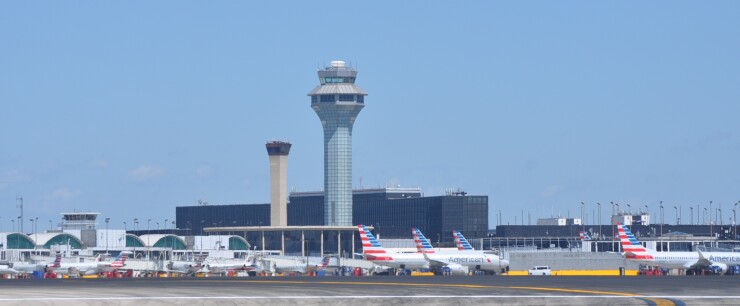CHICAGO – Monday is the deadline for firms to submit their qualifications to develop, design, finance, and operate a proposed express train between downtown Chicago and O’Hare International Airport.
The Chicago Infrastructure Trust is managing the submissions process. The RFQ process announced by Mayor Rahm Emanuel in late November marks the first step in a selection process that could bring to fruition an express system long sought by Emanuel and his predecessor Richard M. Daley if financing obstacles are overcome and the public and City Council are won over.
Emanuel has stressed that “no taxpayer funding will support the project” so private financiers will need strong profit incentives if the city is not putting any skin in the game, several market participants have said.
City officials have not put a price tag on the public-private partnership project but market participants and transportation experts have said it could cost several billion dollars.

“The project is to be funded solely by project-specific revenues (e.g., farebox revenue, advertising revenue, etc.) and financed entirely by the concessionaire,”
“The city will cooperate with the selected respondent with respect to accessing federal credit and tax-exempt bond programs if necessary to the project’s financial plan. However, if the concessionaire utilizes any federal financing instruments as part of its ultimate Project plan of finance, such financing instruments shall be secured solely by the Concessionaire,” the RFQ adds.
Emanuel has pursued the project, billing it as part of his efforts to build on the city’s international reputation and business groups have endorsed it.
“Strengthening connections between the economic engines of downtown Chicago and O’Hare airport, at no cost to taxpayers, will build on Chicago’s legacy of innovation and pay dividends for generations to come,” Emanuel said last year in announcing the RFQ.
Some critics question the value of the project unless expanded to offer additional stops, whether the city would truly bear no fiscal commitment, and worry about the cost of a ride in order to make it attractive to private partners.
The city and trust initially set a Jan. 24 deadline for proposals but extended it to Feb. 5. Officials anticipate but are not “bound to” releasing a shortlist from the proposal in March, releasing a draft request for proposal to short-listed members in May, with proposals being presented in August and final RFP proposals due in November.
“In the event that there is only one qualified respondent, the city may proceed to direct confidential negotiations of a P3 agreement with the qualified respondent,” the RFQ says.
Frequent Chicago Transit Authority trains already link O'Hare with downtown in less than 45 minutes, for $5.
The city’s primary goal is to provide better access and cut transit time by more than half – with the ride taking 20 minutes or less. The RFQ reports that 20,000 air passengers travel daily between O’Hare and the Chicago Central Business District and that’s forecast to grow to at least 35,000 daily air passengers in 2045.
“Ultimately, the project will act as a key economic driver, alleviate congestion, and provide reliable express service to and from the airport,” the RFQ says.
The city has offered three prospective routes but is open to alternatives. The line may be constructed on, above or below surface corridors and would include two initial stations. The concessionaire will be responsible for performing final design in accordance with the P3 Agreement.
The CIT website lists hundreds of requests for a copy of the RFQ. In addition to media, transit organizations and agencies, the list also includes major investment firms and funds, investment banks, advisory and law firms, accounting firms, major construction companies, engineering and design firms, and insurers.
Emanuel announced early last year a goal to get the project off the ground over the next three years and hired Bob Rivkin, former general counsel at the U.S. Department of Transportation, to aid in that goal. Engineering firm WSP Parsons Brinckerhoff had already been examining routes for the service. It was reported last summer that Emmanuel had met with tech entrepreneur Elon Musk about the project and Musk tweeted after the RFQ was announced that he planned to pursue the project.





